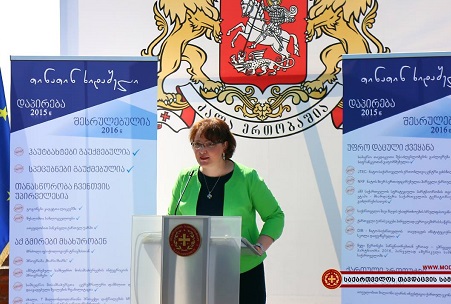How has Georgia’s defence improved in past year?
Defence Minister releases annual report

Georgia’s defence sector has made vast improvements in the past 12 months, allowing the country to play a stronger role in regional and international security, says Defence Minister Tinatin Khidasheli.
Khidasheli made a special statement this morning summarising the Ministry’s annual activities and her first year as the country’s Minister of Defence. She spoke about the achievements made, the current challenges and the future goals of the Ministry.
She believed Georgia will become an "integral and inseparable” part of the North Atlantic Treaty Organisation’s (NATO) Black Sea Safety Conception, and the upcoming NATO Summit in Warsaw on July 8-9 in Poland will make Georgia’s role in this more "definite and obvious”.
She also highlighted three key directions she believed could significantly boost Georgia’s international role and self-defence capabilities.

Minister answered questions asked by media representatives. Photo by Ministry of Defence.
These were:
- Introducing new tools and instruments that would increase Georgia’s ability to defend itself, and mentioned the Georgia-France deal about purchasing air defence weapons as an example of this kind of cooperation.
- Increasing Georgia’s role in the Black Sea Safety Conception, which involved NATO members and allies patrolling the Black Sea as a way to ensure security and safety in the region. Khidasheli stressed Georgia was an integral part of this concept however Georgia had no Navy and developing this field required significant financial resources, therefore NATO’s presence in the Black Sea was hugely beneficial for ensuring safety in Georgia’s Black Sea region.
- A trilateral format of Georgia-Azerbaijan-Turkey relations that worked to ensure the safety of oil and gas pipelines. This type of trilateral relations would help solidify Georgia’s role as a transit country.
MOD @tinakhidasheli: #Equality is our priority.We opened chapels.Regardless religion all should have the possibility to serve it's country
— MOD Georgia (@ModGovGe) June 27, 2016When speaking about the achievements under her leadership Khidasheli named:
- The Noble Partner trainings in Georgia this year that saw Georgia troops participate in military exercises alongside NATO troops;
- Training and testing of hundred Georgian soldiers who became qualified and licensed by NATO. Within the next year Georgia will have another 100+ NATO-qualified soldiers;
- The NATO-Georgia Joint Training and Evaluation Centre (JTEC). After the Warsaw Summit the centre will be officially licensed by NATO, and this will be the first licensed centre in a non-NATO member state;
- Increased support for servicemen and the families of deceased soldiers. One-time compensation for families of diseased soldiers increased to 100,000 GEL ($43,000), monthly compensation increased to 1,000 GEL ($428), accommodation was provided for deceased soldiers’ families, servicemen’s salaries increased by 20-25 percent, extra allowances for soldiers with many children and more;
- Making the Ministry more transparent to the media and general public;
- Abolishing special polling stations for soldiers;
- Reintroducing contract-based military service;
- Serving Georgian meat to the Army instead of importing foreign, frozen meat, which resulted in a saving of 40 million GEL ($17 million). From July 2016 Georgian chickens would replace imported chicken. Eventually 90 percent of the products consumed by the Army would be locally produced;
- Greater cooperation between the Government and business sector to support soldiers. For example the Ministry’s Thanks for Your Service campaign, which saw about 20 local companies offer various services to soldiers and their families via a special Army Card issued by the Bank of Georgia;
- Establishing Georgia’s East, West and Air Command Centres;
- Carrying out steps to reduce bureaucracy.
Minister Khidasheli said the current situation in the European Union (EU) and United Kingdom’s recent decision to separate from the organisation would not deter or hinder Georgia’s Euro-Atlantic intentions.
 Tweet
Tweet  Share
Share